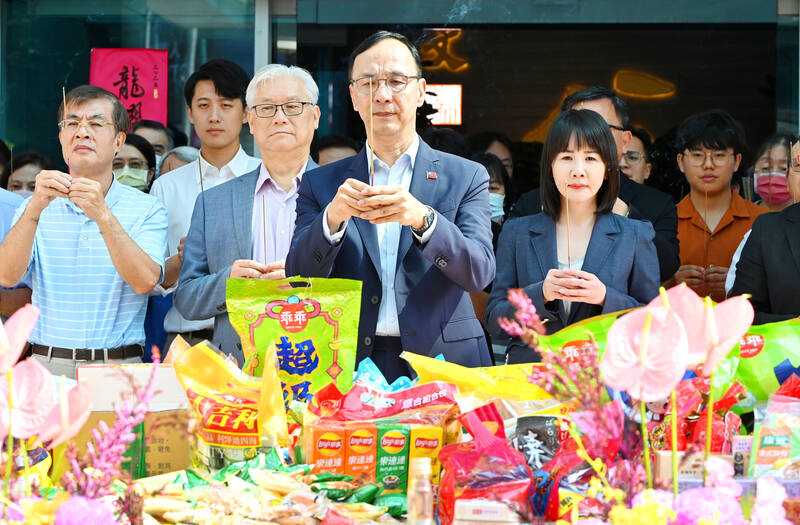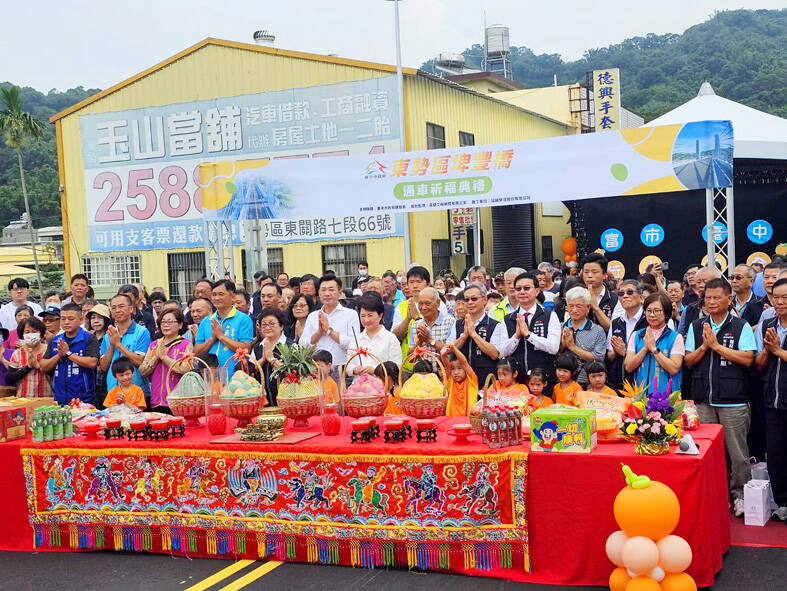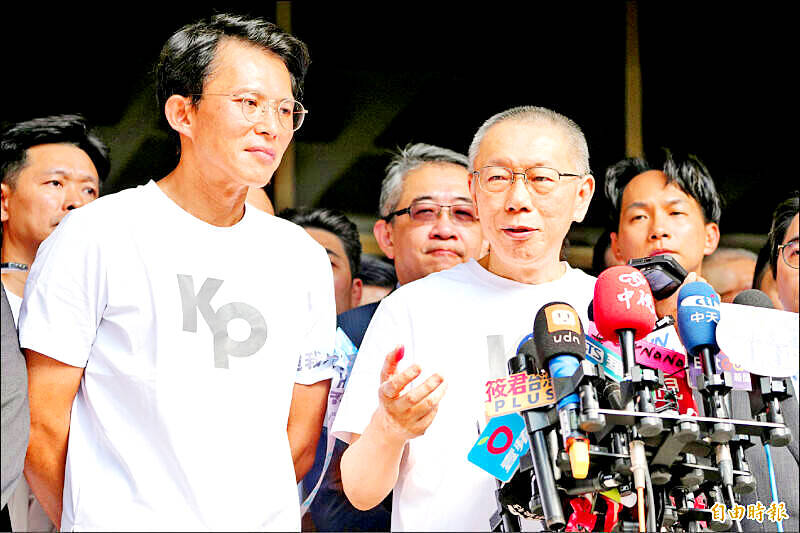This year was supposed to be a quiet, non-election year. Instead, it has been a non-stop rollercoaster ride.
All three major political parties currently face potential leadership crises, and how they manage their challenges will be politically consequential for years to come.
Taiwan People’s Party (TPP) founder Ko Wen-je (柯文哲) was on Monday released from jail on NT$70 million (US$2.3 million) bail, with the stipulation that he must stay at a registered address, wear an electronic monitoring device, not leave the country and refrain from contacting other defendants or witnesses in the case. If the past is any guide, prosecutors will appeal to the High Court, which will revoke the bail and order him back to jail.

Photo: Tian Yu-hua, Taipei Times
If that does not happen, there is considerable discussion about the party having “two suns,” meaning two leaders and potential for conflict between Ko and current TPP Chairman Huang Kuo-chang (黃國昌).
It seems unlikely that will happen in the short term; their interests are closely aligned. However, as negotiations with the Chinese Nationalist Party (KMT) approach over the local elections next year, the potential for conflict could rise — but the giant wildcard is whether time in prison has changed Ko’s thinking, and if so, how?
If the Democratic Progressive Party (DPP) is engaged in reflection over the failure of the “Great Recall,” they are not discussing it publicly. Instead, they are engaged in a brutal internal war to oust party caucus convener Ker Chien-ming (柯建銘), which comes across as a scapegoating exercise to deflect from facing serious deficiencies in the party that reach to the very top.

Photo: Oh Su-mei, Taipei Times
IS CHU OUT?
The collapse of the recall campaigns against 31 KMT lawmakers was a big boost for the party and they are basking in victory. However, as with the DPP, self-reflection appears to be lacking — this was not so much a victory by the KMT as an own-goal defeat by the DPP.
A Formosa poll for the first time in years shows greater support for the KMT — at 36.3 percent — than towards the DPP at 33.1 percent, while the KMT’s allies, the TPP, have risen to second at 34.2 percent.

Photo: TT file photo
The KMT is looking stronger than it has in many years under the most effective leadership in well over a decade. A looming party chair race on Oct. 5 could potentially undo much of that progress.
Popular Taichung Mayor Lu Shiow-yen (盧秀燕), meanwhile, had hinted at joining the race, but then ruled it out. She was the clear favorite to win, with widespread support and enough political heft to dominate the party and lead it through to the 2028 national elections.
With Lu out, the KMT has belatedly started to realize just how successfully Eric Chu (朱立倫) has led the party and restored their viability as a political force despite significant external challenges, massive financial liabilities and frequent internal rebellions.
In May, Chu first mentioned that he looked forward to a “smooth transition” to the next party chair, but at the time a deeper read of the full interview revealed it was a litany of woe about how hard the job was, and an implicit warning following Lu’s announcement that she was considering a run.
While he may have been kicking around the idea in May of leaving at the end of his term, since then he appears to have become more convinced to do so.
It is possible he is playing a hardball version of the common “do you really want me” game in Taiwan politics — i.e., when a politician feigns disinterest or claims other commitments, but if enough of a ground swell arises in support, they will “reluctantly” accept “for the good of the party.”
After seeing that game play out over the years, it is usually easy to spot — but not this time.
Chu has every reason to feel exhausted after years of struggle and taking the blame for the party’s problems, while receiving little credit for its successes. Constantly begging for money to keep the party from financial ruin, herding a fractious party while being everyone’s favorite punching bag would wear anyone down.
While currently the party’s political star is shining bright, the party faces significant challenges that the public is paying little attention to.
According to the latest financial report submitted to the Ministry of Interior, at the end of last year, the KMT had NT$2.1 billion (US$69.4 million) in liabilities. Chu has mentioned needing to raise NT$100 million per month, though that might be in total, including existing income.
Others have suggested that an additional NT$20 to NT$40 million is needed to be raised monthly — perhaps to pay interest and keep rolling over debt, though that is just speculation based on the stability of the reported total liabilities from 2023 to last year.
Regardless of which of those numbers is the most accurate, it is a huge challenge for the party chair.
Further challenges in the immediate future include roughly 100 ongoing cases against KMT personnel and supporters for voter fraud during the disastrous KMT-led attempts to recall DPP lawmakers and potentially difficult negotiations with the TPP on divvying up which party will be running for which positions in the local elections next year.
So it is entirely possible Chu is serious in not running for re-election. Why not take a break and end on a high note?
IS CHU IN?
Another possibility is he is playing hardball, but would need serious concessions to stay on.
Realizing that the nine declared candidates — and two undeclared possibilities — are all flawed and problematic in their own ways, many in the party fear who will lead the party into the next two elections cycles. With Lu out, who better to lead the party than the one who has turned their fortunes around?
If Chu were to consider running again, his price would be high. He would demand loyalty and promises not to undermine his authority going forward. He may also demand increased fundraising by top party figures.
This would require many powerful figures and factions in the party to swallow their pride and get behind him, including groups like the association of city and county council speakers and deputies, and groups that have been diminished, like the once-mighty Huang Fu-hsing (黃復興) military veteran’s faction.
Which way will Chu go? We’ll know by Sept. 19, the last day to file to run.
Donovan’s Deep Dives is a regular column by Courtney Donovan Smith (石東文) who writes in-depth analysis on everything about Taiwan’s political scene and geopolitics. Donovan is also the central Taiwan correspondent at ICRT FM100 Radio News, co-publisher of Compass Magazine, co-founder Taiwan Report (report.tw) and former chair of the Taichung American Chamber of Commerce. Follow him on X: @donovan_smith.

Google unveiled an artificial intelligence tool Wednesday that its scientists said would help unravel the mysteries of the human genome — and could one day lead to new treatments for diseases. The deep learning model AlphaGenome was hailed by outside researchers as a “breakthrough” that would let scientists study and even simulate the roots of difficult-to-treat genetic diseases. While the first complete map of the human genome in 2003 “gave us the book of life, reading it remained a challenge,” Pushmeet Kohli, vice president of research at Google DeepMind, told journalists. “We have the text,” he said, which is a sequence of

On a harsh winter afternoon last month, 2,000 protesters marched and chanted slogans such as “CCP out” and “Korea for Koreans” in Seoul’s popular Gangnam District. Participants — mostly students — wore caps printed with the Chinese characters for “exterminate communism” (滅共) and held banners reading “Heaven will destroy the Chinese Communist Party” (天滅中共). During the march, Park Jun-young, the leader of the protest organizer “Free University,” a conservative youth movement, who was on a hunger strike, collapsed after delivering a speech in sub-zero temperatures and was later hospitalized. Several protesters shaved their heads at the end of the demonstration. A

Every now and then, even hardcore hikers like to sleep in, leave the heavy gear at home and just enjoy a relaxed half-day stroll in the mountains: no cold, no steep uphills, no pressure to walk a certain distance in a day. In the winter, the mild climate and lower elevations of the forests in Taiwan’s far south offer a number of easy escapes like this. A prime example is the river above Mudan Reservoir (牡丹水庫): with shallow water, gentle current, abundant wildlife and a complete lack of tourists, this walk is accessible to nearly everyone but still feels quite remote.

In August of 1949 American journalist Darrell Berrigan toured occupied Formosa and on Aug. 13 published “Should We Grab Formosa?” in the Saturday Evening Post. Berrigan, cataloguing the numerous horrors of corruption and looting the occupying Republic of China (ROC) was inflicting on the locals, advocated outright annexation of Taiwan by the US. He contended the islanders would welcome that. Berrigan also observed that the islanders were planning another revolt, and wrote of their “island nationalism.” The US position on Taiwan was well known there, and islanders, he said, had told him of US official statements that Taiwan had not